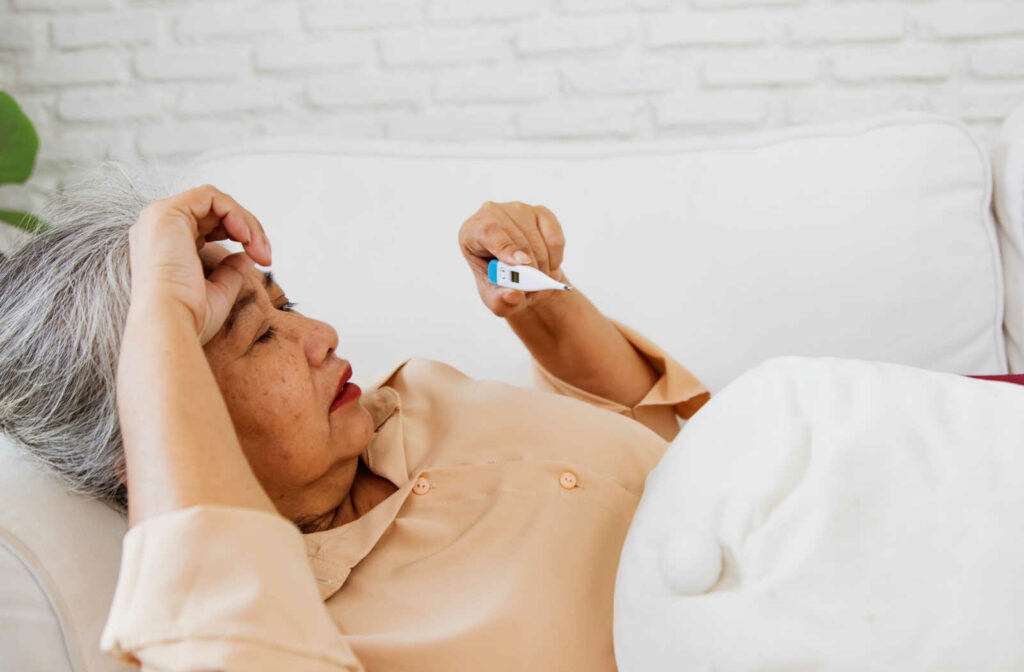Key Takeaways
- A fever of 103 F (39.4 C) or higher is concerning in older adults.
- Seek immediate care if a fever is accompanied by symptoms like confusion, severe headache, rash, chest pain, or seizures.
- Fevers in older adults can result from viral infections, bacterial infections, or heat exhaustion.
- Early detection and treatment of fever-related symptoms can prevent serious complications.
- Senior living communities can offer 24/7 compassionate care for residents experiencing health concerns, including fevers.
If your loved one has a fever, you want them to receive the best care possible. Fevers can be tricky, and you may wonder when you should be concerned. Knowing when to take them for professional care can help protect their health.
In seniors, you should be concerned about a fever when their body temperature is too high or they experience additional symptoms. Fevers can fluctuate in severity, so it’s important to know when a fever is concerning.
When to Be Concerned About Your Loved One’s Fever?
A fever of 103 F (39.4 C) or higher is concerning in older adults. Additionally, experiencing a high fever with other symptoms is worrying.
Visiting a medical professional is important if your loved one experiences a high fever. If left unaddressed, fevers can lead to health complications, especially in seniors.
Other Worrying Symptoms
Depending on the cause of the illness, your loved one may experience other symptoms. You should seek immediate medical attention if you notice any of these signs in an older adult:
- Severe headache
- Rash
- Severe light sensitivity
- Stiff neck or pain when bending their head forward
- Confusion, strange behavior, or slurred speech
- Persistent vomiting
- Difficulty breathing or chest pain
- Abdominal pain
- Pain when urinating
- Convulsions or seizures
Immediate medical attention is crucial for anyone experiencing these symptoms. Early treatment can help protect their health.
What Can Cause a Fever?
Your body typically regulates heat by generating and losing it at the same time. A specific part of the brain helps balance heat production and loss when you’re healthy. When you’re sick, this heat production and loss aren’t equal, causing a fever.
Your brain sets your body temperature high when you’re sick. In the process, you become hotter, but your body has trouble losing heat.
You can have a fever for several reasons, including infections or heat exhaustion.
Viral Infection
Viral infections happen because of viruses. A virus enters your body and multiplies, eventually making someone sick.
If your loved one develops a viral infection, their immune system must fight it off. Treatments can help manage symptoms in the meantime. For some viruses, vaccinations can help prevent someone from getting them.
Types of viral infections include:
- Common cold
- Flu
- HIV
- Ebola
- COVID-19
Bacterial Infection
Bacterial infections occur when harmful bacteria enter the body, causing an illness or medical condition. Bacteria can interact with someone’s skin, gut, lungs, heart, brain, or other areas of the body.
Some common types of bacterial infection include:
- Food poisoning
- Skin, ear, or sinus infections
- Bacterial pneumonia
- Urinary tract infections
Many types of infections aren’t serious and are treatable with antibiotics. However, untreated bacterial infections can go further into the body and affect other aspects of your loved one’s health. Always watch for symptoms of these infections.
The most common symptom of a bacterial infection is a fever, but chills, fatigue, and headaches can be other signs.
Heat Exhaustion
Heat exhaustion can be common during the summer months and dangerous for seniors. This condition happens when body temperature rises but doesn’t cool down. A senior may have heat exhaustion if they experience:
- Dizziness
- Fever
- Fatigue
- Nausea & vomiting
- Fast, shallow breathing
- Severe sweating
Drinking water, cooling down in any nearby shade or inside, or resting can typically help if someone experiences heat exhaustion. If symptoms continue, your loved one may need medical attention.
Older adults should take several precautions during summer to prevent heat exhaustion, including:
- Drinking enough water
- Keeping fans nearby
- Using an air conditioner
- Dressing for the weather
- Wearing sunscreen
- Asking their doctor if any medications can increase the risk of overheating
Give Your Loved One Consistent, Compassionate Care
If you want your loved ones to receive the care they need whenever they need it, you may want to consider senior living. These communities have 24/7 available staff to care for your loved one’s needs—whether it’s a fever or help getting dressed. The care your loved one requires depends on their unique needs.
This decision can be tough, but you can always visit our community to see what everyday life is like for residents. We can answer any questions you may have!Contact The Lodge at Historic Lewes if you’re interested in senior living for your loved one.




